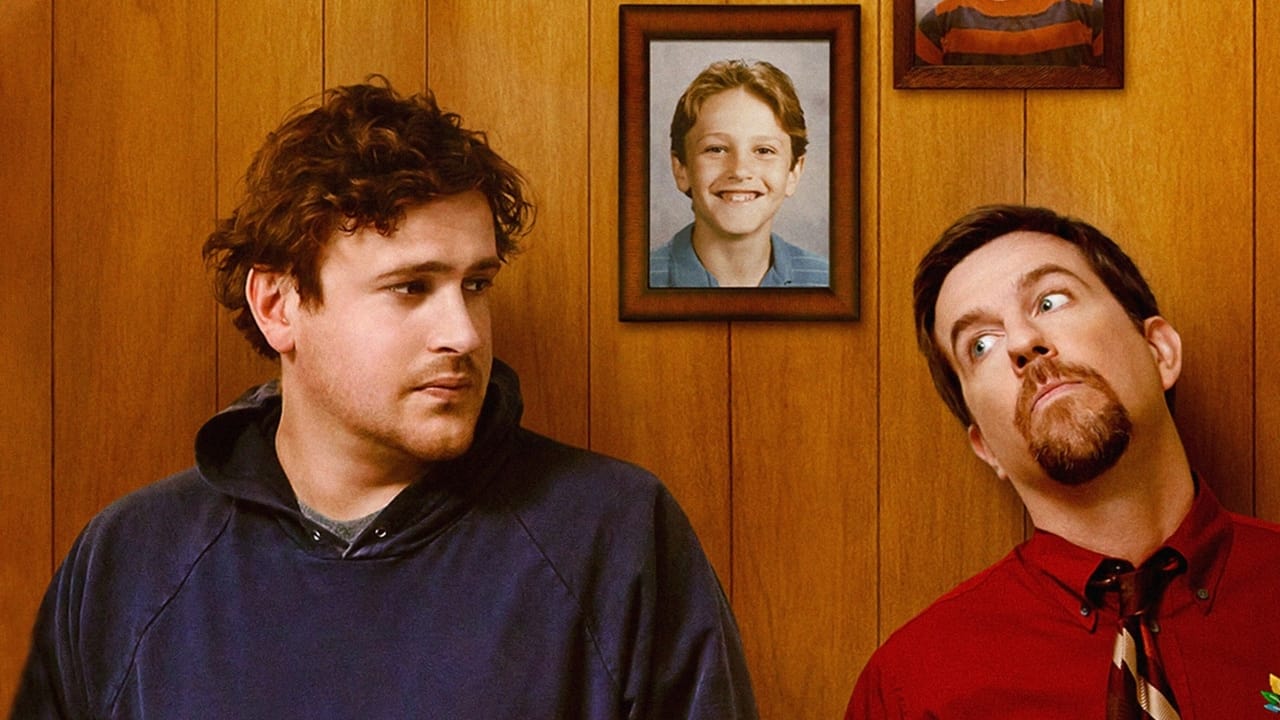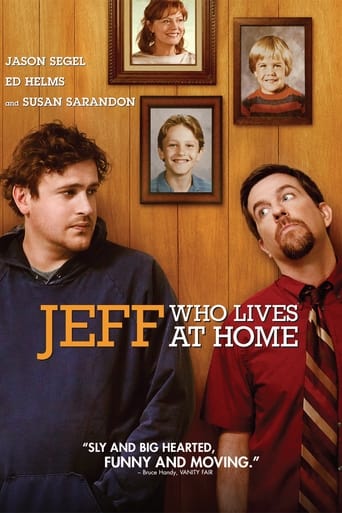sharky_55
Jason Segel is Jeff, a thirty-something jobless stoner still living with his mother and lazily waiting around for his true calling. His opening monologue has plenty of potential. He doesn't just love M. Night Shyamalan's Signs, he thinks the movie is speaking directly to his soul, calling him into action, guiding him towards the universe's signals. This is all before it cuts to reveal him sitting on the toilet, and then makes the well worn journey back to the TV and couch, and where his bong lies. Jeff's little opening mantra, like the film's soundtrack, contains the right amount of whimsy to rope the audience into rooting for him - we're waiting for the beat to pick up, for him to finally break into a run. But the rest of the character is thinly drawn. Segel is familiar with the role - he made mid-life loserville look effortless in Forgetting Sarah Marshall, where he was so defeated even his capacity for self-pity was all but extinguished. But here even his laziness is lazy. He might look the part with the sullen stare, rolled shoulders, and an entire wardrobe comprised of baggy hoodies, but there is little personality beyond the intro. Where is the lived-in monotony, of a bong hit so familiar that it stings? Jeff is told to go outside for an errand, and he meekly abides, swinging his arms and peering curiously at the sun. It's a casual sketch of a recluse. His hazy, misguided motivations ring true; we recognise that he is more in love with the idea of destiny's calling than actually getting off the couch. It works too, until he just walks out anyway. Along the way he bumps into his more conventionally successful brother, and the Duplasses' intent is to gradually reveal how similar their plights really are. We recognise that almost instantly anyway from Ed Helms' hapless performance, and seeing how dismally his wardrobe reflects his priorities: he goes through the entire film in his work uniform, and with the dismissive demeanour of a bullying manager. There's no charm in the role, and we shift uncomfortably as he tries to smoothly play off a surprise splurge on a sports car, but ends up looking pathetic instead. Pat is a loser, although a different kind from his brother. But like a bad Alexander Payne, the film doesn't know when to stop bashing its characters, until we're past the dark humour and into plain sad territory. It goes all the way, only to let them off easy after all. Greer's dialogue has a way of cutting right into the heart of Pat's patent narcissism and past all his self-aggrandising bullsh*t, and it's a wonder she is still there to accept him into her loving arms at the end. The Duplasses fight Jeff's theory of placing himself at the centre of the universe by well, placing him at the centre of the universe, making a big, melodramatic show of him jumping into the river and pulling off a heroic deed. The women, in comparison, seem to exist in the real world. We're touched by Sarandon's weary, middle-aged musings on her missed opportunities because she is someone we all recognise or even occupied. She was supposed to be in the peace corp, tending to a gang of adorable orphans, and in her regret she mixes a little self-awareness in there, as if she fully realises just how naive that youthful, self-gratifying fantasy really was. By far the most annoying aspect of the film is its style. Call it mumblecore, indie, low-budget, whatever - no label can hides how unmotivated and nauseous it is here. The Duplasses' favoured technique are those jarring, jerking half zooms, which don't serve any apparent compositional purpose, but simply appear to yell in the viewer's ear and loudly proclaim its authenticity. While mockumentary shows such as Modern Family and The Office fully embrace the camera's fly-on-the- wall presence, as if their everyday zaniness has to be seen to be believed, Jeff, Who Lives at Home throws it in as a stylistic commitment it can't pull off. It wants to be real, but not too real. It has the neat, bow-wrapped ambitions and comedic situations well tread by the twenty minute sitcom, but ends up dragging out its philosophy into something far more pretentious. It might just be some wood glue, but the implication is life-changing.
justin miller
The Duplass brothers film, Jeff, who lives at home is a charming film about the story of a basement dweller who is on a journey to find his destiny and his families as well. The Camera-work in this film at the beginning I thought would be a annoying distraction with all the zooming but it ended up being not as bad as I felt it would be as it was fitting to the film . The performances are all good, no one has an amazing performance but they all did good and helped me feel for these characters. The story was very good, it is a small feel good story about family, and destiny. I was tearing up at the end of the film and I really cared about these characters. It's got a lot of charm, some people I can tell will probably not like this film, but if you are fan of dramedies you will love this movie.
sol-
Acting on the belief that everything happens for a reason, a 30 year old layabout sets out on a quest to find out who "Kevin" might refer to after a wrong number phone call in this brisk independent American comedy. Jason Segel is well cast as the philosophical title character who waxes poetic over how the seeming randomness in films like M. Night Shyamalan's 'Signs' leads to perfect moments, and while ostensibly pathetic (unemployed, living at home and no girlfriend), Segel moulds a surprisingly warm and likable character. His quest also has a delightful sense of spontaneity as he plans nothing in advance and simply goes off perceived clues that he finds along the way. Much of the film, however, revolves around him reconnecting with his narcissistic older brother, played by Ed Helms, who is rather grating. There is also an oddly slotted in subplot involving the brothers' mother, but Susan Sarandon is fortunately so solid and down-to-earth in the role that it seldom seems like a distraction when the film cuts away to her. Clocking in at just over 80 minutes, the one thing that can be said about 'Jeff, Who Lives at Home' is that it never outstays its welcome. The extremely upbeat note on which the film concludes seems a little at odds with the project's otherwise unglamorous take on very real people, but it is still a pleasant enough experience and one that leaves open some food for thought. The title character is the only person in the film who is content and optimistic throughout, so perhaps there is something to be said for being a 'slacker' in life?
filmchasing
A man who lives at home follows signs that bring him closer to his destiny. Most of these characters are facing life/relationship problems, but Jason Segel brings a lovable, quirky dorkiness to a film that inevitably carries lots of heart. The premise only works if you go along for the ride, and it doesn't hurt that the characters are likable - for the most part. Part fun, part strange, it's a down-to-earth world that becomes large because of its themes and ideas. Check it out! 7.3/10

